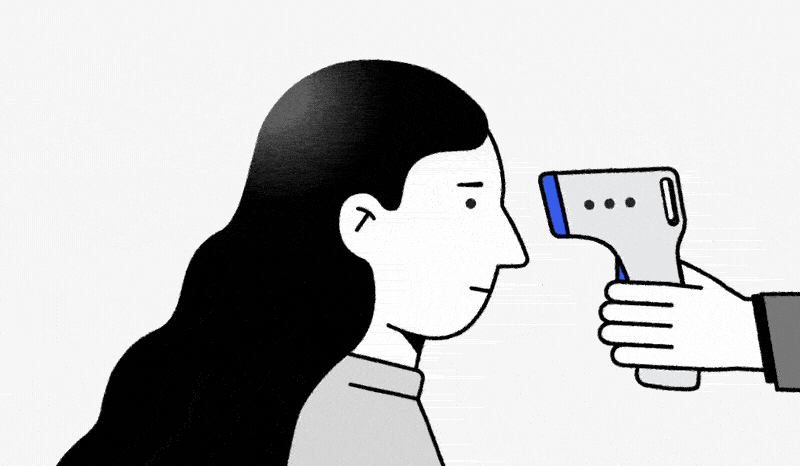Six ways Covid is still impacting businesses

It ain’t over yet.
While the pandemic may have retreated from the front pages, business leaders continue to cope with Covid-19, even three years after the virus emerged. Across a range of companies and industries, the pandemic is still having very real effects.
As Zoe Hart, who leads human resources at freelancing platform Upwork, recently told WorkLife, “It’s easy to think Covid is over and everybody’s fine, but I don’t think that’s true.”
Here are six of the ways Covid-19 continues to impact businesses.
Employees are still sick
“Like every other business, when someone calls in sick, we require a Covid test, and if they are positive they must remain at home for two weeks,” said Robert Burns, CMO at health and wellness company Nuleev.
A recent study by the Brookings Institution found that long Covid-19 is keeping as many as 4 million people in the U.S. out of work. The economic burden of lost wages due to long Covid is approaching $200 billion a year and is likely to rise, according to the study.
While absenteeism has created some issues for Nuleev, the company has managed to create workarounds. Burns’ people tend to step up when one of their colleagues is out sick, he explained. Further, sick employees have been given the option to work from home even beyond the quarantine period, which has eased the burden on the rest of the staff.
As variants continue to emerge, however, absenteeism remains a real concern for businesses. “Due to the recent Covid-19 wave, I have received many sick leave applications,” Andrei Kurtuy, cofounder and chief commercial officer of resume service Novoresume, said, adding that as several employees have fallen ill at once, it has impacted his company goals.
Kurtuy said he has instituted regular meetings with staff to come up with flexible deadlines so employees are not forced to work during their recovery, and so the business does not suffer even more.
Finances are still strained
The pandemic continues to put tremendous financial pressure on businesses, especially small businesses.
Dean Lee, head of marketing at Sealions, a maker of health and wellness products, pointed to a survey of 5,800 small firms his company undertook, which revealed that enterprises had on average only two weeks of cash on hand.
Some businesses continue to feel the effects more than others.
“Having a business in the hospitality sector was horrendous during the pandemic — unfortunately, Covid still affects us,” said Adam Van Tassell, proprietor of the Birch Forest Lodge resort in Minnesota. While the business has been slowly recovering, he noted, it continues to experience difficulties.
Among those difficulties is continued changes in business operations to ensure the health and safety of employees and customers, and to ensure visitors are comfortable. Employees have had to shift their focus to help develop solutions for the business as well, he added. “Reopening and the relaxing of Covid rules did not bring an influx of customers as we’d hoped, because people are still afraid,” he said.
Regulations are still a factor
While the six-feet rule and mask mandates have largely vanished, variants continue to emerge and disrupt businesses, meaning jurisdictions and individual businesses have had to remain vigilant about reinstating such safeguards.
“Our business is connected to the travel industry, and while it has been slowly recovering from the pandemic, governmental restrictions and mandates are still having a negative impact,” said Cody Candee, founder and CEO of baggage management platform Bounce.
As travelers cross state and international boundaries, Candee explained, they find that every governmental body has its own policies in relation to travel restrictions, mask mandates and even ease of entry.
These ever-changing rules and governance surrounding Covid-19 have caused uncertainties among travelers, who are left unsure of what they have the freedom to do or not do. Thus, many continue to avoid travel altogether.
Residual staffing issues in the airline industry have also discouraged travelers, Candee pointed out. “Though we are confident that the industry will come back as restrictions ease, it will be a long process and will continue to impact our business’ bottom line until things return to normal,” he said.
The supply chain remains in flux
Another major effect of Covid-19 that is still felt across business sectors worldwide is its impact on supply chains.
“Owing to trade route closures as a result of the inadvertent health-related threats of not doing so, companies have had to witness unprecedented delays in their cargo shipments being sent,” said Joshua Rich, founder and CEO of location-based marketing firm Bullseye.
“Not so infrequently, many have even shut down permanently, and others still never received booked orders,” he said. “This has led to massive financial losses on both the wholesaler and retailer sides.”
The National Law Review recently proposed a number of best practices for minimizing disruption in business due to supply chain issues, including lining up multiple suppliers, developing risk assessments on primary and secondary suppliers, and creating detailed mapping of critical suppliers
Remote workers must be managed
As companies continue to allow employees to work from home, it has created a strain for many businesses.
Take the website Financer.com, where half the team is working remotely and the other half is in the office. “Coordination has definitely taken a hit,” said Johannes Larsson, founder and CEO. “Since we are operating in 26-plus countries and have as many country managers, it can sometimes be difficult for our department managers to bring everyone on the same page.”
At the same time, the arrangement has had an impact on expenses. “Besides our regular offices, we are buying subscriptions to premium tools so our online workers can match feet with us,” Larsson said. “This hybrid work model has not been liberal to our account balances.”
Furthermore, lack of accountability “misses its spark” among remote workers, Larsson said. “No more banging cabin doors to get tasks done. The hard truth is that a laid-back approach has given birth to productivity issues,” he added.
With so many businesses having made WFH a permanent fixture, they have no option but to continue managing remote employees.
“Over the next two years, businesses will need to reckon with the employee desire for flexible, hybrid work and the employer desire to fill office spaces,” said Zach Dunn, founder of hybrid work management platform Robin.
Most roles, he argued, are not designed for working from anywhere, and while emerging trends like digital nomad visas have the potential to support remote work internationally, there’s not a workable model for remote employees within the country. “It’s not sustainable to expect everyone nationwide to be paid the same amount as if they live in midtown Manhattan, but there needs to be careful thought put into how to adjust pay for people living within similar regions less tied to a specific state,” Dunn said.
Employee mental health remains a concern
Whether remote or in-office, Covid-19 continues to cast a shadow over the attitudes and mental health of employees.
While physical effects of long Covid-19 can be detrimental, organizations must also recognize the side effects on mental health that can impact businesses, argued Samer Saab, CEO of Explorance, a provider of people insights solutions.
“When the percentage of engaged employees declines, it negatively impacts business. Institutional memory becomes foggy. Skills dissolve. People make mistakes. Customers are unhappy. Sales are lost. These gaps in individual performance ripple across the workforce and add up to a chronic condition called corporate long Covid,” Saab said.
In such a tight job market, corporate long Covid, or CLC, can produce painful gaps in skills between seasoned employees who left and new hires brought in to replace them, creating an ongoing gap in skills that will take years to overcome, Saab added. The condition may be costing organizations millions of dollars.
To recover from CLC, companies should follow four key steps, according to Saab:
- Recognize the symptoms
- Diagnose the cause
- Get treatment
- Monitor to make sure the problem is gone
Many businesses continue to scramble to unlock the key to employee happiness, offering perks that are “subjective” and “impractical,” Saab added. But for the long-term health of businesses and the satisfaction of employees, the most important thing business leaders can do is ensure workers are “happy and useful,” he argued.
“Usefulness requires competence, willingness, engagement and a desire for continuous learning…and leads to more meaningful employee happiness,” Saab said.


